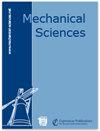基于动态和小波包分解的铣削颤振识别
IF 1.5
4区 工程技术
Q4 ENGINEERING, MECHANICAL
引用次数: 1
摘要
摘要在金属铣削加工中,特别是在加工低刚度工件时,颤振是影响表面质量、加工效率和刀具寿命等诸多方面的关键因素。为了避免颤振,从信号处理的角度出发,提出了一种基于动态小波包分解(WPD)的铣削颤振识别方法。通过锤击试验获得了系统的动态特性。基于颤振频率在系统固有频率附近达到峰值的原理,对原始铣削力信号进行WPD分解,选取含有丰富颤振信息的子信号进行信号重构。通过数值分析和频谱对比,验证了该重构方案的鲁棒性。然后,对重构信号的时频域图像和希尔伯特谱特征进行比较分析,识别颤振;最后,通过实验验证了该方法对颤振识别的有效性和可靠性。本文章由计算机程序翻译,如有差异,请以英文原文为准。
Milling chatter recognition based on dynamic and wavelet packet decomposition
Abstract. In metal milling, especially in the machining of low-stiffness workpieces, chatter is a key factor affecting many aspects such as surface quality, machining efficiency, and tool life. In order to avoid chatter, a milling chatter identification method based on dynamic wavelet packet decomposition (WPD) is proposed from the perspective of signal processing. The dynamic characteristics of the system are obtained by a hammer test. Based on the principle that the chatter frequency will reach a peak value near the natural frequency of the system, the original milling force signal is decomposed by WPD, and the sub-signals containing rich chatter information are selected for signal reconstruction. After numerical analysis and spectrum comparison, the reconstruction scheme is proved to be robust. Then, the time–frequency domain image of the reconstructed signal and the Hilbert spectrum feature are compared and analyzed to identify the chatter. Finally, the validity and reliability of the proposed method for chatter recognition are verified by experiments.
求助全文
通过发布文献求助,成功后即可免费获取论文全文。
去求助
来源期刊

Mechanical Sciences
ENGINEERING, MECHANICAL-
CiteScore
2.20
自引率
7.10%
发文量
74
审稿时长
29 weeks
期刊介绍:
The journal Mechanical Sciences (MS) is an international forum for the dissemination of original contributions in the field of theoretical and applied mechanics. Its main ambition is to provide a platform for young researchers to build up a portfolio of high-quality peer-reviewed journal articles. To this end we employ an open-access publication model with moderate page charges, aiming for fast publication and great citation opportunities. A large board of reputable editors makes this possible. The journal will also publish special issues dealing with the current state of the art and future research directions in mechanical sciences. While in-depth research articles are preferred, review articles and short communications will also be considered. We intend and believe to provide a means of publication which complements established journals in the field.
 求助内容:
求助内容: 应助结果提醒方式:
应助结果提醒方式:


